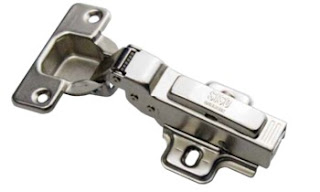Which kitchen hinges should I choose? : A guide to Full Overlay, Half Overlay, Inset and More!
Choosing the right hinges for your kitchen cabinets might
seem like a small detail, but it can significantly impact both the look and functionality
of your space. With so many options available, understanding the different
types can be overwhelming. This blog post will break down the main differences
between kitchen hinges, including overlay styles, closing mechanisms, and
mounting types, to help you make the best choice for your project.
Understanding Overlay: The Key to Cabinet Appearance
The "overlay" refers to how much the cabinet
door covers the cabinet frame. This is the primary factor in determining which
hinge type you need. There are three main types:
·
Full Overlay Hinges: These hinges are
used when the cabinet door completely covers the cabinet frame. This is a
popular choice for a sleek, modern look, as it minimizes the visible frame.
Full overlay hinges require careful measurement to ensure proper door alignment
and clearance.
·
Half Overlay Hinges: In this
configuration, the cabinet door partially covers the frame, revealing a portion
of it. Half overlay hinges are often used when multiple doors share a single
frame, allowing them to sit side-by-side without overlapping.
·
Inset Hinges: Inset doors sit inside
the cabinet frame, flush with the face. This creates a traditional, framed
look. They can be more challenging to install and may limit interior cabinet
space.
Beyond Overlay: Closing Mechanisms and Mounting
Options
Once you've determined the overlay type, you need to
consider the closing mechanism and how the hinge attaches to the cabinet.
Closing Mechanisms:
·
Standard Hinges: These are your basic,
no-frills hinges. They simply swing open and closed. They are the most
budget-friendly option but lack any special features.
·
Soft Close Hinges: These hinges
incorporate a hydraulic mechanism that gently slows the door as it closes,
preventing slamming and reducing wear and tear. Soft-close hinges add a touch
of luxury and are a worthwhile upgrade for a quieter kitchen.
·
Push-to-Open Hinges: These hinges allow
you to open the cabinet door with a gentle push. They are often used in
contemporary kitchens where handles are not desired, creating a clean,
minimalist aesthetic.
Mounting Types:
·
Screw-On Hinges: These hinges are
attached to the hinge plate with screws.
They are a common and relatively easy to install option.
·
Clip-On Hinges: These hinges feature a
clip mechanism that allows the door to be quickly and easily detached from the hinge
plate. This is particularly useful for cleaning or maintenance.
Choosing the Right Hinge
Selecting the correct hinge depends on several factors,
including the desired aesthetic, budget, and functionality.
·
Consider your kitchen style: Modern
kitchens often utilise full overlay and push-to-open or soft close hinges,
while traditional kitchens might favour inset or half overlay hinges.
·
Think about functionality: Soft-close
hinges are a great investment for a quieter and more luxurious feel.
·
Factor in your budget: Standard hinges
are the most affordable, while soft-close and push-to-open options will cost
more.
By understanding the differences between these kitchen hinge types, you can make an informed decision and choose the perfect hardware to complement your cabinets and create a functional and beautiful kitchen space.

.jpg)


